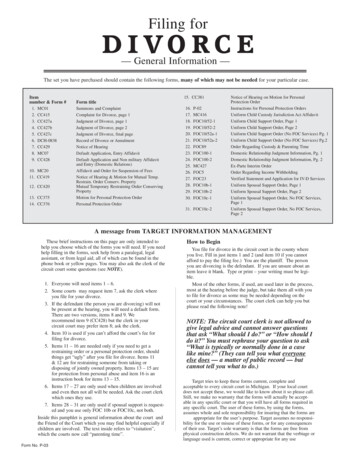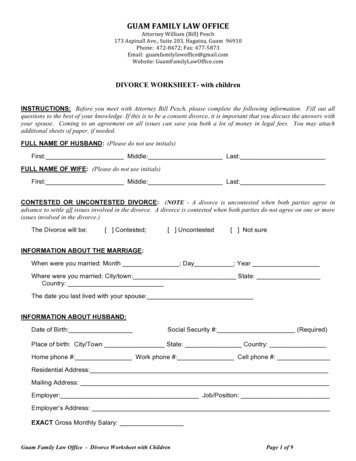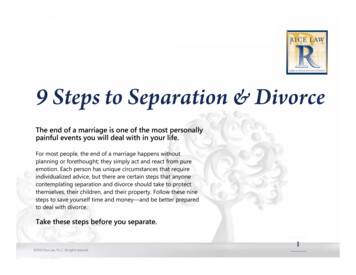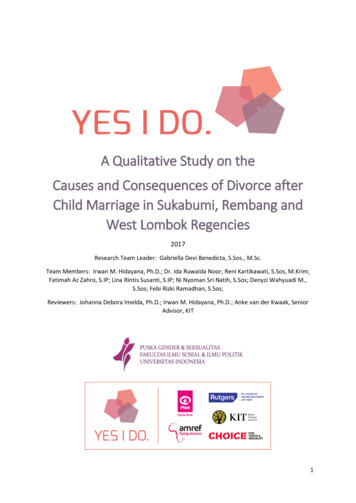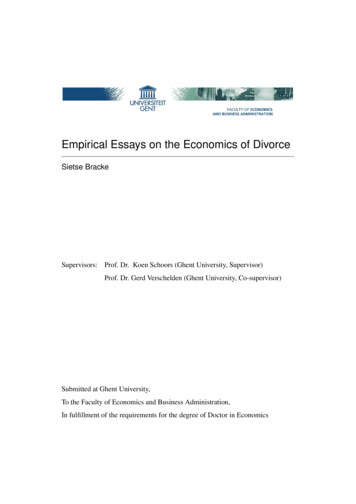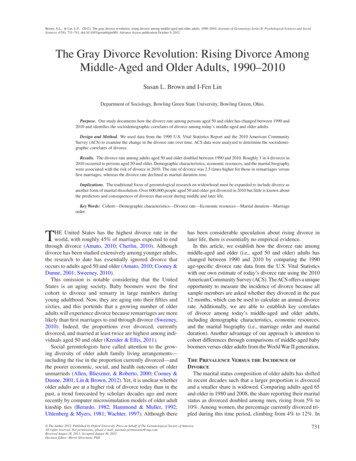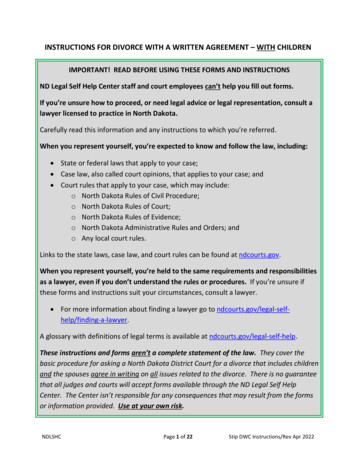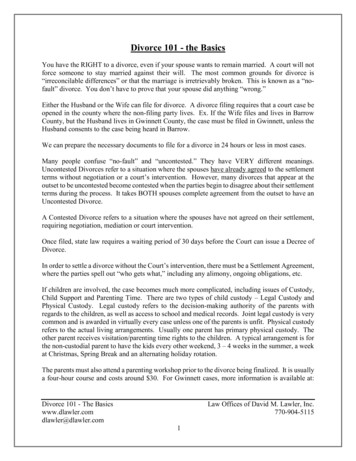
Transcription
Divorce 101 - the BasicsYou have the RIGHT to a divorce, even if your spouse wants to remain married. A court will notforce someone to stay married against their will. The most common grounds for divorce is“irreconcilable differences” or that the marriage is irretrievably broken. This is known as a “nofault” divorce. You don’t have to prove that your spouse did anything “wrong.”Either the Husband or the Wife can file for divorce. A divorce filing requires that a court case beopened in the county where the non-filing party lives. Ex. If the Wife files and lives in BarrowCounty, but the Husband lives in Gwinnett County, the case must be filed in Gwinnett, unless theHusband consents to the case being heard in Barrow.We can prepare the necessary documents to file for a divorce in 24 hours or less in most cases.Many people confuse “no-fault” and “uncontested.” They have VERY different meanings.Uncontested Divorces refer to a situation where the spouses have already agreed to the settlementterms without negotiation or a court’s intervention. However, many divorces that appear at theoutset to be uncontested become contested when the parties begin to disagree about their settlementterms during the process. It takes BOTH spouses complete agreement from the outset to have anUncontested Divorce.A Contested Divorce refers to a situation where the spouses have not agreed on their settlement,requiring negotiation, mediation or court intervention.Once filed, state law requires a waiting period of 30 days before the Court can issue a Decree ofDivorce.In order to settle a divorce without the Court’s intervention, there must be a Settlement Agreement,where the parties spell out “who gets what,” including any alimony, ongoing obligations, etc.If children are involved, the case becomes much more complicated, including issues of Custody,Child Support and Parenting Time. There are two types of child custody – Legal Custody andPhysical Custody. Legal custody refers to the decision-making authority of the parents withregards to the children, as well as access to school and medical records. Joint legal custody is verycommon and is awarded in virtually every case unless one of the parents is unfit. Physical custodyrefers to the actual living arrangements. Usually one parent has primary physical custody. Theother parent receives visitation/parenting time rights to the children. A typical arrangement is forthe non-custodial parent to have the kids every other weekend, 3 – 4 weeks in the summer, a weekat Christmas, Spring Break and an alternating holiday rotation.The parents must also attend a parenting workshop prior to the divorce being finalized. It is usuallya four-hour course and costs around 30. For Gwinnett cases, more information is available at:Divorce 101 - The Basicswww.dlawler.comdlawler@dlawler.comLaw Offices of David M. Lawler, Inc.770-904-51151
www.gwinnettcourts.com. The state has specific guidelines as to how much the non-custodialparent must pay and it varies case to case.In all cases involving minor children, child support is awarded. It is mandated by the State and isnot optional. Child support is required until the child turns 18 or graduates from high school,whichever is latter. Child support is not required beyond the child’s 20th birthday, however, evenif they are still in high school. The calculation for child support is very complex and should notbe left to those with no experience using the state-required Child Support Worksheet, a multiplepage spreadsheet with a myriad of factors in consideration.How Property is Treated in a Georgia Divorce CaseWhat is property?Everything with exchangeable value or anything that goes to makeup a person's wealth: everyinterest, estate, obligation, or right to property. Anything that you own or that generates income isconsidered to be under the category of property:Your car, your furniture, money in bank accounts, retirement plans, even a business or a professionis property. In a divorce action, property also means what you partially own and owe money on; itincludes your debts.The law in Georgia views marriage as a relationship between partners, taking into account themonetary and non-monetary contributions of each spouse to the family unit. Even if one of thepartners never “earned one dollar” during the marriage, that partner is considered to havecontributed to the family's property (or wealth) acquired while the couple was married andhas rights to a percentage of that marital property.How does the law divide property?Georgia is an "equitable distribution state" which means that all marital property is subject todivision. Separate or Non-Marital Property is not subject to division.Equitable distribution means “what’s fair under the circumstances.” It doesn’t necessarily meanhalf. On a practical level, a Court will usually ascertain the total of all marital property and awardroughly half to each side. There are always exceptions. What’s “fair” to a judge is rarely the samething as what a husband or wife considers “fair.”Divorce 101 - The Basicswww.dlawler.comdlawler@dlawler.comLaw Offices of David M. Lawler, Inc.770-904-51152
Types of PropertyThere are generally two types of property: Real Property, which is real estate and PersonalProperty, such as securities, bonds, bank accounts, automobiles, household furniture, jewelry,paintings, books, record collections, and the family dog, to mention a few.Real PropertyReal property includes all real estate. It includes your home, beach house, condominium, or thatinterest in some real estate investment held in both your names, or titled solely in one spouse'sname or held by another for your benefit.There are several options available to deal with real property in your Separation Agreement.First, one spouse can sign over their entire interest in the property to the other spouse. Second,both spouses can agree to the sale of the property. Third, another practice often followed isgiving the right to one of the parties (usually the custodial parent) to remain in the home for acertain period of time, particularly until the children reach their age of majority or become self-supporting. Another possibility is to allow one party to remain in the home, to have the houseappraised, to fix the equities of the parties as of that date, then to allocate whatever appreciationmay be attributable to the house to the party who then continues to make the payments, and thatperson gets whatever increase or decrease in value there may be at the time that the house isactually sold. There are other questions, too. If one of the parties remains in the house and thatperson makes the payments on the house, does that person also get the tax advantages, whichinclude the interest payments and state property taxes as a deduction on his/her income taxreturn? Or does the other spouse, who is perhaps paying support as well as house payments, havethe benefit of that deduction?With any real estate, similar agreements or tradeoff of interest in properties can be made. Someexamples are as follows: (1) a husband could sign over the family home to the wife in exchangefor the wife signing over to him the beach property and her interest in his share of theirinvestment in their real estate syndicate. (2) the wife could sign all properties, other than thefamily home, over to the husband in exchange for the husband paying a greater sum in spousalsupport. (3) the husband could pay a lump sum to the wife in exchange for her signing over herinterest in any real estate to him.Often, one spouse desires to purchase the other's interest in joint real estate. You may wish tohire one or two independent, licensed appraisers to determine the fair market value of theproperty before you and your spouse decide on any "buy out" terms. Again, you cannot be overlycautious in considering tax consequences. Be sure to check with your tax adviser before any"buy out" between you and your spouse.Divorce 101 - The Basicswww.dlawler.comdlawler@dlawler.comLaw Offices of David M. Lawler, Inc.770-904-51153
Personal PropertyPersonal property includes items such as securities, bonds, savings accounts, checking accounts,retirement funds, retirement accounts, pensions, automobiles, household furniture, jewelry,books, record collections, paintings, and/or other objects of art. Any of these items can be usedas a tradeoff for other items. A separation agreement should definitely contain some provision asto what should be done with all these accumulated goods.Marital vs. Separate or Non-Marital PropertyMarital property includes all property that was acquired during the marriage, regardless of how itis titled (in whose name it is). Gifts from one spouse to another are marital property if they werepurchased with marital funds. Pensions and business interests that were developed by one or bothspouses are considered marital property if they were acquired during the marriage.Non-Marital property refers to property acquired before marriage and never commingled, propertyobtained through inheritance or by gift from a 3rd party, or property excluded by a valid agreementbetween parties (ex. a pre-nup).What if it isn't clear what category the property fits into Marital or Non-Marital?In the absence of an agreement between parties, the Court will decide what property is to beconsidered marital property. In the case that property falls into both categories such as a car thatwas purchased in part with money from one partner's non-marital funds and in part with maritalfunds, the Court will determine what percentage of the car is marital property and what percentageis non-marital property and factor this into a monetary award when the property settlement isdecreed. It can also order the sale of the property and division of the proceeds, such as with realestate. The Court will also consider issues of alimony/spousal support in determining propertysettlement issues.Factors to be taken into account in determining the amount of the monetary award to bothparties:1) The contributions, both monetary and nonmonetary, of each party to the wellbeing ofthe family:Consider: Did you concentrate on homemaking and childrearing to the exclusion ofgenerating an income that would have enabled you to bring property into the marital unit?Divorce 101 - The Basicswww.dlawler.comdlawler@dlawler.comLaw Offices of David M. Lawler, Inc.770-904-51154
Did you put your spouse through school? Did you bring money into the marriage that youearned when you were single, or that came from an inheritance, etc. and mingle it withfamily funds?2) The value of all property interests of each spouse:Consider: Do you or your spouse have considerable property that the Court will considernon-marital and that can generate an income for you? This will affect any monetarysettlement.3) The economic circumstances of each spouse at the time that the award is to be made:Consider: Are you unemployed? Have you been out of the job market for a number ofyears? Do you have assets?4) The circumstances and facts which contributed to the estrangement of the parties:Consider: Even though fault (adultery, desertion) are not supposed to be grounds for denialof a monetary award, there still may be some impact if the case seems pretty open-and-shut. For example, if a Wife commits adultery, which is the cause of the break-up, shewill be denied spousal support (alimony).5) The duration of the marriage:Consider: If you have been married for a long time and were totally economicallyintertwined or interdependent, the Court will view settlement differently than if this was atwo year marriage between individuals with the same earning capacity.6) The age and physical and mental condition of the parties:Consider: See #5 above. This situation will be compounded in a long term marriageparticularly if the dependent spouse is sick.7) How and why specific marital property was acquired, including the effort expended byeach party in accumulating the marital property:Consider: Details of acquisition, sources of funds, etc. Are any of these items familyheirlooms or an inheritance from one spouse's side?8) Any award or other provision which the Court has made with respect to family usepersonal property or the family home, and any award of alimony:Consider: All of these categories will be factored into the Court's decision.Divorce 101 - The Basicswww.dlawler.comdlawler@dlawler.comLaw Offices of David M. Lawler, Inc.770-904-51155
9) Such other factors as the Court deems necessary and appropriate to consider in order toarrive at a fair and equitable monetary award:Consider: Are there children involved? Their welfare and best interests are primary in theeyes of the Court. The Court will favor the children not being moved out of the familyhome which may mean that the family home will not be sold until the youngest child is 18years old. This is a very different picture than if there are no children and one of thepartners wants to "cash out" of the family home.Relationship between Monetary Award and AlimonyAlimony may be awarded to either spouse for their support and maintenance after the divorce. Itis based on the financial circumstances of the divorcing spouses. The needs of one spouse andthe ability of the other spouse to pay are the primary factors in determining alimony. Alimonymay be paid in a lump sum of money or the award of some property.Alimony in a Georgia Divorce CaseUntil 1980, there were no provisions under Georgia law for alimony. The Divorce Code of 1980provides that the court may allow alimony to either party "only if it finds that alimony isnecessary." That means ALIMONY IS NOT A RIGHT - i.e. it’s not automatic. Even if the otherparty is “at fault,” it’s not a presumption that you are going to get alimony.Alimony is granted by court order or by mutual agreement incorporated into a court order. Thatmeans that if the parties agree on alimony, the Court will likely grant it. If the parties don’t agreeand one party fights to get alimony against the objection of the other party, the Court will considerthe factors set forth below and determine whether alimony is appropriate.In Georgia, alimony is authorized in limited situations. It is not the broad remedy that it is in someother states. It is not intended to punish a spouse for their actions during the marriage.Additionally, alimony is typically granted awarded when a long-term marriage ends and only whenother factors warrant it. Just because a marriage was long, that doesn’t automatically translate intoalimony. That being said, it is unusual to see alimony awarded upon the end of a short-termmarriage.So, what IS alimony?Divorce 101 - The Basicswww.dlawler.comdlawler@dlawler.comLaw Offices of David M. Lawler, Inc.770-904-51156
Alimony is money paid for the financial support of the other spouse. It is usually paid on a monthlybasis after a divorce is granted, but sometimes even while a divorce is pending. If awarded whilethe divorce is pending, it is usually done under a Temporary Order (meaning an order that isn’t theFINAL ruling of the Court, but one that is in effect until a subsequent Order is made). Under aTemporary Order, the support payment is often called “maintenance.”Alimony in Georgia is either "rehabilitative" or "permanent."Rehabilitative alimony is intended to be a short-term measure which enables a spouse to get backon his or her feet. Alimony is awarded to enable the other spouse to go back to school or to acquireneeded skills that would enable them to be competitive in the job market. Sometimes a spouse whohas chosen the role of becoming a homemaker and raising children has been unable to develop ormaintain the job skills necessary for productive and gainful employment. This situation is ripe foran award of rehabilitative alimony."Permanent alimony" continues for a long period of time, possibly even until the death of the partyreceiving the alimony and is usually awarded when one of the parties is unable to work due to agephysical or mental illness.Either type of alimony can be for either a short or long period of time.Finally, and frustratingly, there is no set mathematical formula for determining how much alimonyshould be awarded. It is always a “case by case” analysis and no two cases are alike.Factors in Determining AlimonyIf the court determines that a spouse is eligible for alimony, the following factors are thenconsidered in making the award:Georgia Annotated Statutes: 19-6-5.(a) The finder of fact may grant permanent alimony to either party,either from the corpus of the estate or otherwise. The followingshall be considered in determining the amount of alimony, if any, tobe awarded:(1) The standard of living established during the marriage;(2) The duration of the marriage;(3) The age and the physical and emotional condition of bothparties;Divorce 101 - The Basicswww.dlawler.comdlawler@dlawler.comLaw Offices of David M. Lawler, Inc.770-904-51157
(4) The financial resources of each party;(5) Where applicable, the time necessary for either party toacquire sufficient education or training to enable him to findappropriate employment;(6) The contribution of each party to the marriage, including, butnot limited to, services rendered in homemaking, child care,education, and career building of the other party;(7) The condition of the parties, including the separate estate,earning capacity, and fixed liabilities of the parties; and(8) Such other relevant factors as the court deems equitable andproper.(b) All obligations for permanent alimony, however created, the timefor performance of which has not arrived, shall terminate uponremarriage of the party to whom the obligations are owed unlessotherwise provided.Child Support in a Georgia Divorce CaseWhat is Child Support?Child Support is an award of money to be paid from one divorcing spouse to the other for thefinancial support of the minor child(ren) of the parties. It is mandated by Georgia law and maynot be waived by either parent. Child Support is the right of the children, not the parents. Becausea child is not of legal age to waive their right to support, Child Support is NOT optional. It isalways a factor in a divorce when there are minor children to the divorcing parents.If the parents have children together who are 18 or over and have graduated high school, ChildSupport is not required, even if the child still lives in the marital household or is being otherwisesupported by the parents (i.e. in college).How is Child Support calculated?The Georgia Legislature has instituted a complex calculator, the Child Support Worksheet, fordetermining Child Support payments. The Worksheet is required in all Georgia divorce casesDivorce 101 - The Basicswww.dlawler.comdlawler@dlawler.comLaw Offices of David M. Lawler, Inc.770-904-51158
involving minor children to the parties. It is several pages long and often overwhelms those notfamiliar with it.Many factors are considered in the equation, including: how many children are being supported;which parent has primary physical custody;income of both parents, including:o earned income;o commissions, fees & tips;o overtime pay;o severance pay;o retirement income actually being realized;o self-employment income;o income from investments;o income from trusts;o income from annuities;o capital gains;o certain disability or retirement benefits;o worker’s compensation benefits;o unemployment insurance benefits;o prizes or lottery winnings;o judgments recovered from personal injury cases and awards from other cases;o imputed income (ex. if one parent doesn’t work, they will often have income imputed asif they worked 40 hours per week at a minimum wage job – currently 1,256.67/month);ando “other income,” meaning the Judge can consider almost any source of income.medical insurance premiums paid insuring the children;ordinary and extraordinary medical/dental care for the child;expenses associated with child care;costs associated with extracurricular activities; andchild support payments paid by either parent for children other than from the marriage.When all the figures are input into the Child Support Worksheet, it generates a final numberrepresenting how much of the joint income is being/should be spent on supporting the children.This total is then allocated between the parents based on the percentage of the total income earnedby each parent and which expenses are going to be paid (post-divorce) by each parent. Forexample, if the total support required is 1,000.00, Father earns 60%, Mother earns 40% andMother has primary physical custody, Father will pay Mother 600 per month in Child Support.What if physical custody of the children is equally split between parents?This scenario provides a challenge when calculating Child Support, as the Child SupportWorksheet is not currently written in such a way as to accommodate this parenting choice. Thereis only one situation in which the calculation is easy – if each parent has physical custody exactlyhalf of the time, each parent makes the same income and the expenses of the children are all equal.In that extremely rare circumstance, there will likely be an award of 0.00 Child Support. Moretypically, the attorneys and parties carefully calculate the relative discrepancy in income and theDivorce 101 - The Basicswww.dlawler.comdlawler@dlawler.comLaw Offices of David M. Lawler, Inc.770-904-51159
party with higher income pays Child Support to the other parent. Such payments would besignificantly less than if one parent had primary physical custody of the children.What is covered by Child Support Payments and what is not?While every situation is unique, Child Support typically pays for things like housing, food, andclothing – the basic minimum requirements of raising a child. It is also intended to include thingslike entertainment and non-recurring extracurricular activities. Recurring extracurricularactivities, such as sports or music lessons, which are usually well established and incur the samecost each month, should be factored into the Child Support Worksheet.Medical expenses that are not covered by insurance, such as deductibles, co-pays, prescriptionmedications for non-chronic illnesses and orthodontic care are not included. That being said,divorcing parents with children currently in braces will often factor in the cost of orthodontictreatment. However, unless the child is already undergoing treatment, any speculative future costsof orthodontic is not included in the Child Support Worksheet.How long is Child Support to be paid?Per Georgia law, Child Support is required until the child turns eighteen (18) or graduates highschool, whichever comes last, but no longer than their 20th birthday. Therefore, if a child turns 18during their senior year, the child support continues until the month of their graduation. If thechild is still in high school when they turn 20, the final payment required is for the month of that20th birthday.What happens when there is more than one child and the oldest child “ages out.?”This very common scenario leads many divorced parents into trouble and confusion. The rule isthat Child Support payments may not be changed or altered by the parties themselves; an Ordermodifying Child Support is required. Therefore, in the situation with more than one child, theparty paying Child Support should file a Motion to Modify Child Support with the Court as soonas possible when the oldest child ages out. The Court will review the Motion and its supportingevidence, then adjust the Child Support accordingly. If the parent does not file to modify ChildSupport and reduces their payments without Court approval, they run the risk of being heldaccountable for violating the existing Order of Child Support and being forced to pay the otherspouse for an “arrearage” that (practically) should not exist.When the youngest child ages out, the party paying Child Support can simply stop makingpayments at that time, with a few exceptions – i.e. if Child Support is being withheld from theirpaycheck, the employer will usually want to see a court order terminating the ongoing support.Divorce 101 - The Basicswww.dlawler.comdlawler@dlawler.comLaw Offices of David M. Lawler, Inc.770-904-511510
Can Child Support be modified, once established?Yes. The general rule is that Child Support can be re-evaluated once every two years, absent asignificant change in circumstances impacting the parties or child. So, if one parent becomesinvoluntarily unemployed, or gets a job which tremendously increases their income, Child Supportcan be re-evaluated without regard to the two-year rule. Any modifications to Child Support mustbe done through the Court. Judges get very irate when parents modify their payments without theCourt’s blessing.Divorce 101 - The Basicswww.dlawler.comdlawler@dlawler.comLaw Offices of David M. Lawler, Inc.770-904-511511
The Do’s and Do Not’s in Your DivorceTHE DO’sIf possible, put joint credit cards on hold to prevent the other party from charging up large amountsof new debt. Likewise, consider closing any joint bank accounts so they can’t withdraw all themoney. If you do liquidate such an account, give the other party 50% of the balance. Get a receipt.Gather your financial documents for the last 3 years, including tax returns, paystubs, etc.Only turn over documents/evidence to the other side by and through your attorney.Take a Facebook break – This applies to all social media. If you simply MUST maintain a socialmedia presence, do not post about any aspect of the case. Above all, do not post any pictures ofyou with any romantic partners.Get a psychological counselor for assistance with the emotional impact of the case. Keep yourclosest friends and family close for emotional support.If it’s possible that your spouse committed adultery, go to your doctor and get tested for STD’s.THE DO NOT’sDo not Panic - Get a lawyer and listen to their advice.Do not discuss settlement issues with your spouse - that's the attorney's job. If you agree tosomething, even verbally, it can be enforceable.Do not discuss the case with your minor children unless it's absolutely unavoidable. This is goingto be hard enough on them.Do not harass, stalk, abuse or slander your spouse. It opens you to other civil and potentiallycriminal liability.Do not take out any new debt, unless absolutely unavoidable. Do not make large payments to anyexisting debt. These are marital assets and liabilities for the court to decide how to split.Do not sell any marital property without the expressed agreement of the parties, or in the case ofreal estate or retirement accounts, the permission of the Judge.Do not have sex with your spouse once the divorce has been filed.Divorce 101 - The Basicswww.dlawler.comdlawler@dlawler.comLaw Offices of David M. Lawler, Inc.770-904-511512
Divorce 101 - the Basics . You have the RIGHT to a divorce, even if your spouse wants to remain married. A court will not force someone to stay married against their will. The most common grounds for divorce is "irreconcilable differences" or that the marriage is irretrievably broken. This is known as a "no-fault" divorce.


